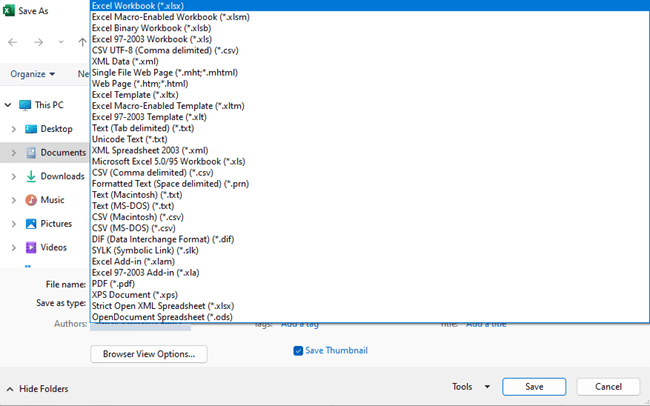With new and emerging software and tech coming out all the time, you might be wondering if it is still worth learning Excel?
The short answer is yes, it is still worth learning Microsoft Excel. Despite the rise of other data analytics tools, Excel remains a popular choice for data management and analysis due to its solid design, reliability, and functionality.
Furthermore, Its vast array of features and functions enables you to easily organize, analyze, and visualize data.
Plus, proficiency in Excel can open many doors in your professional career, as employers still value this skill.
Furthermore, learning Excel is not just about managing data; it also helps you better think analytically.
If you’re considering learning Excel, remember that it’s still regarded as a valuable skill in today’s job market.
So, let’s check out 5 important reasons to learn Excel.

1) The Everlasting Relevance of Excel
Microsoft Excel is like a super-smart assistant for numbers. It’s a computer program that helps people organize and calculate things easily.
Even though there are fancy new tools, Excel is still super important because it’s simple, powerful, and can be used by almost anyone to make life easier with numbers.

On another note, Excel is still essential is because it’s versatile. Its flexible nature means it can be used in many different ways in businesses, such as:
Creating budgets and financial forecasts: Excel simplifies financial management, enabling you to work with advanced Excel functions and create charts and graphs for data visualization.
Tracking expenses, inventory and sales: With Excel, you can do inventory management, organize sales data, and monitor trends to better inform your business decisions.
Analyzing customer data and generating reports: Excel offers powerful tools for sorting, filtering, analyzing and presenting data, which help you interpret data easily.
When you learn Excel, you’re preparing for success in various work settings.
Also, Excel’s ability to adapt and its many features, plus how well it works with other systems make it a valuable skill to have in today’s world where data is crucial.
2) Importance of Excel in the Professional World
Excel proves itself as a powerful tool for business and data analytics. Its advanced math capabilities let you handle large data sets and perform complex calculations.
With advanced Excel skills, you can swiftly analyze data, automate tasks, and boost overall productivity.
In today’s era of data-driven decisions, Excel remains crucial for various industries.
So, having solid Excel proficiency undoubtedly enhances your job search and CV.
In many careers, Excel is seen as a vital skill that improves job prospects and boosts your salary.
To sum up, Excel is still worth learning for business professionals. So, invest time in learning and mastering Excel to advance your career and increase productivity.
Now, let’s look at its functions.

3) Microsoft Excel’s Functionalities
Excel has so many functions that can be used across all industries, but let’s look at the core ones.
3.1) Excel Formulas and Functions
Excel provides a wide range of built-in formulas and functions that make it easy to do complicated calculations in no time.
Whether figuring out averages, doing conditional sums, or working with text, Excel’s features let you use logic and arguments to achieve the desired results.

Here are some of the most popular functions used in Excel:
SUM: Adds up a range of numbers
AVERAGE: Calculates the average of a range of numbers
IF: Applies a condition based on a logical test
VLOOKUP: Searches for a value in the first column of a table and returns a value in the same row from a specified column
If you haven’t already, polish up on the above functions, make sure you know how to use them and put yourself ahead of the competition.
Now, let’s look at VBA and Macros!
3.2) VBA and Excel Macros

Visual Basic for Applications (VBA) is a powerful programming language that allows you to create and automate tasks within Excel sheets.
With a basic understanding of VBA, you can customize your workbooks, create specialized functions, and build tailor-made applications.
A more accessible alternative to VBA is using Excel’s Macro Recorder.
Macros enable you to automate repetitive tasks and create shortcuts for complex processes. Even without prior programming experience, you can use the Macro Recorder to generate simple code by recording a series of actions you perform in Excel.
3.3) Spreadsheet Services and File Formats
Microsoft Excel is widely recognized as the go-to tool for creating spreadsheets, and it’s compatible with various Microsoft packages. You can use the software on different platforms, making it simple to share and work together on files.

It supports multiple file formats, like the commonly used XLS and XLSX, ensuring that others can easily share and open your spreadsheets.
Moreover, Excel provides cloud-based services, allowing smooth sharing and collaboration, ensuring your work is accessible and secure.
By learning keyboard shortcuts and improving your new skills in Excel, you are investing in a powerful tool that can enhance your data management capabilities, and you can gain a competitive advantage.
But, are the skills you learn transferable?
Let’s see.
4) Transferability of Excel Skills
Being skilled in Excel isn’t just about making spreadsheets; it’s a versatile ability applicable to different jobs and industries. Whether you’re working with financial data or data science, Excel proficiency is a valuable asset that can improve your performance across various professional roles.
The formula and logic-building aspects of Excel contribute to a deeper understanding of programming languages and technology.

Whether you’re working towards a computer science degree or simply have an interest in the field, becoming proficient in Excel lays a strong foundation.
You’ll find that Excel knowledge complements your skills in the following ways:
Programming languages: Working with Excel formulas and functions is like programming, making it easier to grasp principles in other languages such as Python or Java.
Logic building: Excel enhances logical thinking abilities, which are crucial for resolving complex data science problems.
5) Problem Solving with Excel
Excel is an excellent tool for problem solvers.
Let’s see why.

By learning Excel, you’ll develop skills that can help you to:
Identify and rectify mistakes: Excel has various built-in features that can assist you in finding discrepancies in your specific data and making necessary corrections.
Organize and analyze data: Excel’s vast array of tools and functions can help you enter data, sort & filter data, and analyze data efficiently and complete tasks quickly.
Visualize data: With Excel, you’re able to create a dynamic and easy-to-understand data structure, charts, graphs, and dashboards that can significantly help you identify potential issues and opportunities.
By enhancing your problem-solving capabilities and understanding of computer science by learning Excel, you’ll gain a valuable skillset that can be easily transferred to different roles and industries.
This makes investing your time in mastering Excel undoubtedly worthwhile.
Final Thoughts
Learning Excel is a smart investment in your skills because it’s like having a reliable and timeless Swiss Army knife for work tasks.
Just like a trusted tool that never goes out of style, Excel is versatile and applicable in many, if not all professional fields.
Its functionalities go beyond making simple spreadsheets; you can use it to manage finances, organize data, and even tackle complex problem-solving at work.
So, if you’re aiming to be a go-to problem solver and a valuable asset in the workplace, mastering Excel is undoubtedly a great idea!
Interested in discovering how you can take your Excel skills to the next level, check out our latest clip below:
Frequently Asked Questions
What are the current job market trends for Excel skills?
In today’s job market, Excel skills are still highly valued across various industries. Many job roles, such as data analysts, financial analysts, accountants, and project managers, require proficiency in Excel.
As a versatile tool for data manipulation, organization, and visualization, Excel remains an essential skill for many professionals.
However, it is also essential to stay updated with other tools and technologies such as Power BI, Tableau, and Python.
How long does it take to become proficient in Excel?
The time it takes to become proficient in Excel depends on your starting point and dedication to learning.
With consistent practice and a focused approach, it is possible to achieve a basic level of proficiency within a few weeks.
However, becoming an advanced user can take several months or even years. It is essential to invest time in mastering various functionalities such as conditional formatting, pivot tables, VLOOKUP, and advanced formulas to truly harness Excel’s capabilities.
What is the best way to quickly learn Excel?
To learn Excel quickly, you can follow several approaches. You can enroll in online courses, take live workshops, access free tutorials, or even read books that cover different aspects of Excel.
Choose a learning method that matches your preference and schedule. In addition, practice regularly by working on real-life projects or tasks to reinforce the concepts you learn.
Is it necessary to be certified in Excel?
While obtaining Excel certification can showcase your skills and expertise, it is not always mandatory. Many companies value practical experience and proficiency more than certifications. However, in some industries or job roles where the competition is high, certification can help you stand out from the crowd. Ultimately, a mix of practical experience and certification can be helpful in furthering your career.
How is Excel used in data analysis?
Excel is great for analyzing data because it comes with many useful features. Some commonly used tools include sorting and filtering, charts and graphs, conditional formatting, and pivot tables.
It also supports complex formulas and functions, which help you manipulate and analyze data more efficiently. With these tools, you can tidy up and organize data, find insights, and spot trends or patterns in the information.
Are there alternatives to Excel for data analysis?
While Excel remains a popular tool for data analysis, many alternative platforms are becoming increasingly popular. Among them, Python, R, and Tableau are frequently used for advanced analytics and more complex data manipulation tasks.
These alternatives offer various benefits such as better handling of large data sets, more robust analytical capabilities, and easier collaboration features.
However, choosing the right alternative depends on your specific needs, industry, and level of expertise in data analysis.








